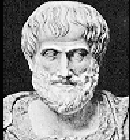| Connections 4 : Greek Science |
|
Aristotle 384-322 B.C.
Aristotle was at great pains to explain his chosen position and even felt the need to examine and discuss the underlying logical construction of his thought. He wrote a major work on logic in which he described and analyzed the now familiar syllogistic form of argument. Just as he classified logic so he tried to analyze and classify all subjects, from political constitutions to forms of motion, as well the animal kingdom. He collected all knowledge of his time and divided it into new branches of learning - thus organized science began. |
|
www link : From the Internet Encyclopedia of Philosophy Aristotle Aristotle from the Biography Center. |
|
Athens decline After Aristotle's time the Greek cities lost real independence, and the political spark went out of Greek life. With this change, the first enthusiastic reach after truth - the creative force of the tragedians, the persistent search for certainty to which Socrates and Plato devoted their lifes, and the voracious appetite for new knowledge which had inspired Aristotle - all faded away. The great Age of Athenian philosophy came to a close. Alexander the Great soon directed Hellenism eastwards and the new center of learning shifted from Athens to Alexandria. There, where Middle Eastern and Greek culture overlapped, Babylonian astronomy and Greek philosophy interacted to produce the sophisticated science of the Hellenistic Age. |
| Back | Next: timetable |
 Plato's successes and failures were mirrored in the work of his greatest pupil, Aristotle,
who thoroughly analyzed Plato's doctrines and formulated replacements of his own. Whereas Plato
had located ultimate reality in Ideas or eternal forms, knowable only through reflection and reason,
Aristotle saw ultimate reality in physical objects, knowable through experience. Objects were composed of a potential, their matter, and of a reality, their form; thus, a block of marble - matter - has the potential to assume whatever form a sculptor gives it, and a seed or embryo has the potential to grow into a living plant or animal form.
Plato's successes and failures were mirrored in the work of his greatest pupil, Aristotle,
who thoroughly analyzed Plato's doctrines and formulated replacements of his own. Whereas Plato
had located ultimate reality in Ideas or eternal forms, knowable only through reflection and reason,
Aristotle saw ultimate reality in physical objects, knowable through experience. Objects were composed of a potential, their matter, and of a reality, their form; thus, a block of marble - matter - has the potential to assume whatever form a sculptor gives it, and a seed or embryo has the potential to grow into a living plant or animal form.